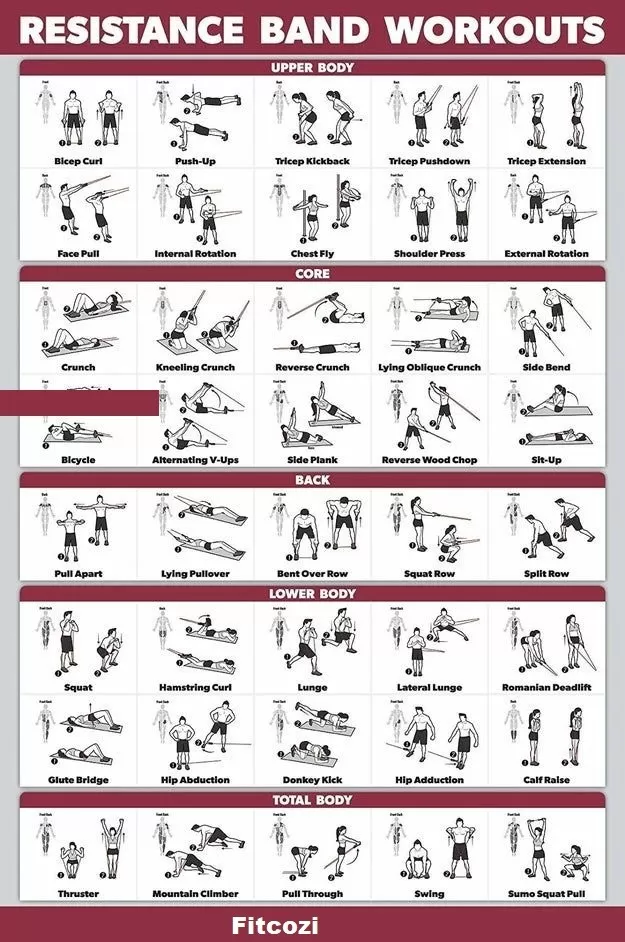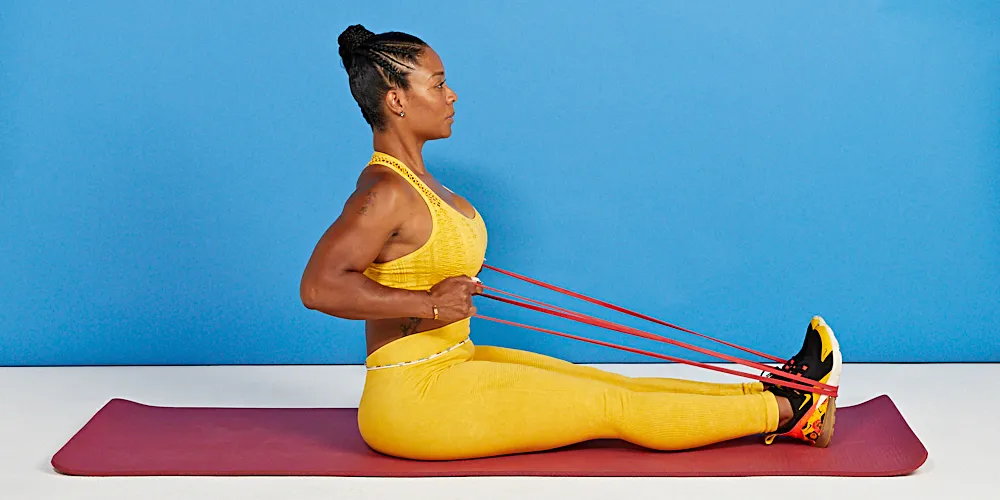Resistance band exercises for over 50 at home
As we age, maintaining an active and healthy lifestyle becomes increasingly important. Regular exercise not only helps to keep our bodies in good shape but also plays a crucial role in maintaining mobility, balance, and overall well-being. For individuals over 50, incorporating resistance band exercises into their fitness routine can be a game-changer. In this comprehensive guide, we’ll explore the numerous benefits of resistance band exercises for those over 50 and provide detailed exercise tables with names, rest periods, and sets to help you get started on your journey to a healthier, fitter you.

Benefits of Resistance Band Exercises for Over 50
1. Joint-Friendly Workouts:
Traditional weightlifting can sometimes place excessive stress on joints, leading to discomfort or even injury. Resistance band exercises, on the other hand, offer a joint-friendly alternative. The bands provide continuous tension throughout the movement, reducing the impact on joints and minimizing the risk of strain.
2. Improved Muscle Tone and Strength:
Resistance bands are versatile tools that engage multiple muscle groups simultaneously. As a result, they promote overall muscle tone and strength. This is particularly beneficial for individuals over 50 who may be dealing with age-related muscle loss or reduced strength.
3. Enhanced Range of Motion:
Flexibility and range of motion are essential components of functional fitness, especially as we age. Resistance band exercises encourage a full range of motion, helping to maintain and even improve flexibility. This can contribute to better posture and reduced stiffness in joints.
4. Convenient and Portable:
One of the key advantages of resistance bands is their portability. They can be easily packed in a suitcase or carried in a bag, making it convenient to stay active both at home and while traveling. This eliminates the need for bulky gym equipment and provides the flexibility to exercise wherever you go.
5. Customizable Intensity:
Resistance bands come in various levels of resistance, ranging from light to heavy. This allows individuals over 50 to customize the intensity of their workouts based on their fitness level and gradually progress as they get stronger. It’s a gradual and safe approach to building strength and endurance.
6. Balance and Stability Improvement:
Many resistance band exercises involve stabilizing muscles, which is crucial for improving balance and stability. This aspect becomes particularly important as we age, helping to reduce the risk of falls and injuries.
Resistance Band Exercise Tables for Over 50 Fitness
Now, let’s dive into a comprehensive set of resistance band exercises designed specifically for individuals over 50. The following tables outline exercises, recommended rest periods, and suggested sets to guide you through a well-rounded workout routine.
Upper Body Exercises
| Exercise Name | Sets | Repetitions | Rest |
|---|---|---|---|
| Bicep Curls | 3 | 12-15 | 1- min |
| Shoulder Press | 3 | 12-13 | 2- min |
| Lateral Raises | 3 | 12-15 | 3- min |
| Seated Row | 3 | 12-14 | 1- min |
Lower Body Exercises
| Exercise Name | Sets | Repetitions | Rest |
|---|---|---|---|
| Leg Press | 3 | 12-15 | 1- min |
| Leg Extensions | 3 | 12-15 | 2- min |
| Clamshells | 3 | 10-15 | 2- min |
| Bridge | 3 | 10-12 | 1- min |
| Squats | 3 | 12-15 | 2- min |
Core and Flexibility Exercises
| Exercise Name | Sets | Repetitions | Rest |
|---|---|---|---|
| Standing Ab Twist | 3 | 12-15 | 1- min |
Tips for a Successful Resistance Band Workout
Start with a Warm-Up: Prioritize a brief warm-up to increase blood flow to your muscles and prepare your body for the workout.
Focus on Form: Proper form is crucial for the effectiveness and safety of resistance band exercises. Pay attention to your posture and movement patterns.
Gradual Progression: Begin with a resistance level that challenges you without causing strain. Gradually increase the resistance as your strength improves.
Listen to Your Body: If you experience pain (not to be confused with the discomfort of a challenging workout), modify the exercise or consult a fitness professional.
Combine with Other Activities: Resistance band exercises can complement other forms of exercise, such as walking or swimming, for a well-rounded fitness routine.
Remember, consistency is key. As with any exercise program, it’s advisable to consult with a healthcare professional before starting a new fitness routine, especially if you have any existing health concerns. Now, armed with this comprehensive guide and exercise tables, you’re well-equipped to embark on your journey to fitness and well-being. Embrace the power of resistance bands and experience the positive impact they can have on your over 50 fitness journey.
